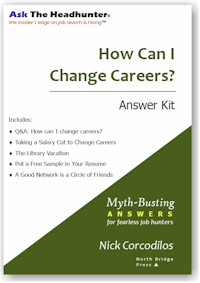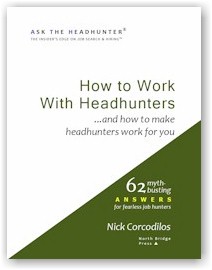In the June 7, 2011 Ask The Headhunter Newsletter, a reader asks what to say when an interviewer inquires why you’re leaving your old employer:
I work in a business where there is a constant flow of people in and out of our office, and a high volume of customers calling on the phone. We get a lot of complaints from customers, and quite a bit of verbal abuse. My co-workers and I don’t feel safe. Extreme as it sounds, we worry about someone walking in the door and going bonkers.
I began a job search this week, and I’ve read online comments about what to say when asked the reasons for leaving my old job. I’ve been advised never to say anything bad about the company, including that it’s not safe. So, I am not sure how to answer this question any more. I have an interview coming up. Can you please give me some advice about what to say when I’m asked the reasons I am leaving my current job? Thanks very much.
Here’s the short version of my advice: (For the entire column, you need to subscribe to the free weekly newsletter. Don’t miss another edition!)
You could be leaving your job because you don’t see growth opportunities, or because you have just grown tired of the work. Or, you might not get along with other employees, or with management. While any of these reasons are legitimate, how you express them could cost you a job opportunity. While some employers are interested in your motivations, I believe this question is almost always “loaded.” The employer wants to know whether you’re trouble.
As you can see, the real problem with this question is that you have no way of knowing the interviewer’s intent. And it’s not worth guessing and being wrong.
If you believe that explaining your reasons for leaving your last job will reflect well on you, then by all means explain. If you’re worried it will hurt you, then keep mum.
How to Say It
“I love my work, and I want to work in a better company where I am free to do my job effectively.”If they ask you what the problem is with your current employer, be honest:
“I’m looking for a good job with a good company, but I never disparage anyone I’ve ever worked with… I came to you because your company seems to be one of the shining lights in this industry, and I’d like to talk about how I can help you be more profitable…” (…This is the missing part… Sorry, but you must subscribe to the newsletter to get the entire Answer and Commentary in the newsletter… Don’t wait til next week… Sign up now… it’s free!)
That’s the best way I know to approach any employer, and to get past that question. Focus on the company you’re meeting with, not on your past or your old company. And be candid about your policy of not bad-mouthing anyone, including your last employer.
I’m sorry you’ve been through so much. Look ahead, find a really good company, and explain how you’re going to help them be more successful. That’s what any good employer looks for.
It’s one of those tricky interview questions: Why are you leaving your old job? If you’re leaving because you’re unhappy, that opens up a can of worms in the interview. So, what do you say, and how do you say it? My suggestion in this week’s newsletter is one way to handle it. How have you handled this? Did it work? Or did it backfire?
.




 Please share your questions, problems and challenges, and I’ll do my best to help, right here on the blog, and in next year’s newsletters. I welcome you to pile on — please tell me where I can help!
Please share your questions, problems and challenges, and I’ll do my best to help, right here on the blog, and in next year’s newsletters. I welcome you to pile on — please tell me where I can help!